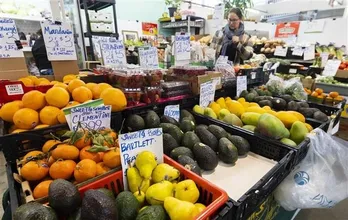
A durian orchard in Tien Giang province’s Cai Lay district that was damaged by saltwater intrusion and drought in the 2019 -20 dry season. (Photo: VNA)
The measures should include zoning areas for each type of fruit, securing irrigation water and providing extra care for fruits that cannot tolerate salinity.
The country’s largest fruit producing region had 25,000ha of orchards affected by saltwater intrusion and lack of irrigation in the 2019 – 20 dry season.
Nearly 11,200ha suffered damages of more than 70 percent, according to the Ministry of Agriculture and Rural Development.
Recently, the delta’s 12 provinces and Can Tho City took measures like adjusting crop farming schedules and storing irrigation water, limiting the damage to rice and other crops since farmers grew them earlier or stopped growing in affected areas.
The provinces of Ben Tre, Tien Giang, Vinh Long, Tra Vinh, and Soc Trang were the worst affected in terms of damage to fruit crops.
Speaking at a recent seminar in Tien Giang province, Tran Van Dung, Vice Chairman of the its People’s Committee, said measures had been taken to cope with saltwater intrusion and drought very early last dry season, yet the losses were higher than in 2016, when saltwater intrusion reached record levels.
In the province, which has the largest area under fruits in the delta, nearly 14,500ha of orchards were affected, he said.
“The province has [since] taken measures to recover the damaged orchards, with the task of washing the soil of salt and rehabilitating affected done with great urgency.”
According to Deputy Minister of Agriculture and Rural Development Le Quoc Doanh, fruits offer higher value than any other crop in the delta.
To protect orchards from the impacts of climate change, relevant ministries and other agencies should closely monitor farming plans in the delta and make forecasts about saltwater intrusion, drought and pests and apprise authorities about measures to prevent them, he said.
Saltwater from the sea is forecast to enter 15 - 20km deeper into rivers than average next year.
At the seminar, the ministry’s Plant Cultivation Department instructed fruit farmers and local authorities to take appropriate measures to cope with it.
It called on owners to measure the salinity of water before irrigating their orchards, warning them the salt content should not exceed one gramme per litre.
For fruits that cannot tolerate salinity like durian, rambutan and mangosteen, it should not be more than 0.5 grammes, it said.
It encouraged farmers to dredge existing orchard ditches and dig new ones to store water, but also use large plastic bags for storage, and use the water efficiently.
They should not grow off - season fruits when there is saltwater intrusion and not enough water for irrigation, it said.
The delta should build a closed irrigation system for fruit growing areas and install automatic saltwater monitoring systems, it added.
The delta has 362,000ha under fruits, accounting for 34 percent of the country’s total fruit area, including high-value fruits for exports such as durian, grapefruit and mango.
Last year its exports were worth 3.7 billion USD.
Le Van Thiet, deputy head of the department, said 988 fruit-growing areas in the delta qualified for export to the US, Australia, New Zealand, the Republic of Korea and other demanding markets have been provided with codes.
The department has also provided codes for 628 fruit-growing areas in the delta to export to China, he said.
The fruits include dragon fruit, mango, longan, rambutan, water melon, banana, jackfruit and mangosteen./.
VNA
 Retailer brings Vietnamese products closer to consumers in Canada
Retailer brings Vietnamese products closer to consumers in Canada



